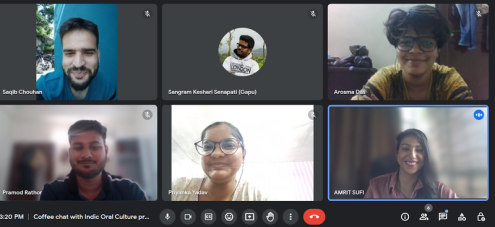Indic Oral Culture is currently a new unrecognized user group that is created with the aim of bringing together Indic language enthusiasts for the digitalization of oral culture. Folk songs, folk tales and other aspects of oral culture and tradition are democratic and community based knowledge that are vanishing fast. This is especially relevant in the case of underrepresented languages where oral culture is being engulfed by politics, socio-economic changes, changes in lifestyle etc. This group of individuals is a bid to document and preserve these by creating a media library for the current and future speakers of the language.
There is a parallel between Wikimedia, a place where every individual can contribute to the sum total of all human knowledge, and oral folk culture which is created and carried forward across generations by the language community. So, the aim is to bring forward the speakers and practitioners of these languages and cultures to document their knowledge system. With this aim in mind, the Indic Oral Culture user group meetups were launched on 26th August 2023.
The user group met online to discuss their languages and cultures, their challenges, and how they can be digitalized. The participants consisted of linguistics scholars: Pramod Rathor – Braj speaker and a PhD candidate for Linguistics, Sangram Senapati – an avid Wikimedian, Arosma Das – MA in Linguistics, Saqib Ishfaq – Gojri speaker and lecturer in Linguistics at Cluster University of Jammu, Amrit Sufi – Angika Wikimedian, and Priyanka Yadav – Ahirwati speaker and MA in Linguistics. They have been researching the oral culture of their language and how it can be digitalized. These meetings bring them together to share their ideas and experiences, thus fostering a community of practice.
The participants shared their experiences with volunteering on Wikimedia, creating audio-visuals of their culture, and learning to add lexemes on Wikidata. They were given primary demonstrations for utilizing the Wikimedia projects to create a media library for the audio-visuals and to transcribe them.
The Oral Culture Transcription Toolkit that provides guidelines on recording audio-visuals of the folk literature, transcribing the text on Wikisource will be utilized to train the participants further.
If you want to be part of the user group and or participate in the monthly meetings, edit the participants section and enter your name there, or contact me at amritsufi2@gmail.com. We are also looking forward to feedback!

Can you help us translate this article?
In order for this article to reach as many people as possible we would like your help. Can you translate this article to get the message out?
Start translation
